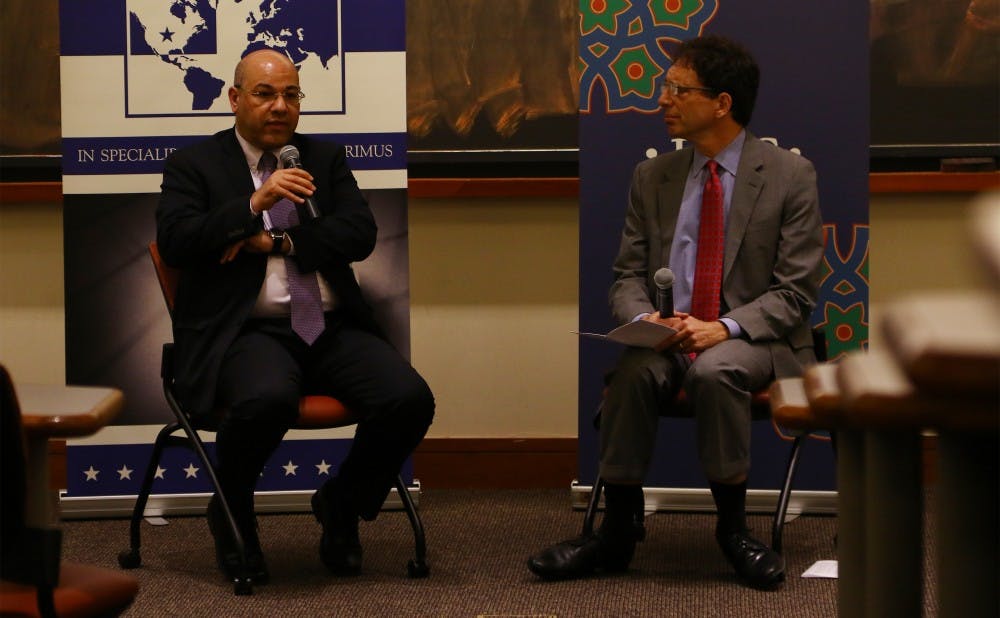Lukman Faily, Iraqi ambassador to the U.S., spoke about sectionalism in Iraq and the social and economic challenges facing the country during a discussion at Duke Thursday.
Faily, who was appointed to his position in 2013, first answered questions from David Schanzer, associate professor of the practice in the Sanford School of Public Policy, and then from students and guests in the audience. He emphasized that the sectional conflicts between Iraqi groups are just one part of Iraq's current struggles and added that his country's governance and economy also serve as barriers to achieving stability.
During the talk, called “U.S.–Iraqi Relations in the Age of Daesh/ISIL,” Faily said the country has become resilient to threats from the Islamic State group and hopes to retain its democratic principles despite the group's violence.
“It’s more or less as if we are too thick-skinned now to be stopped by [the Islamic State group's] activities,” Faily said. “Even with all the threats, I can assure that [Iraq] will not stop having elections and the like. We want to raise democracy and we want to be securer, but that doesn’t mean we’ll do that at the cost of freedom.”
Faily said he believes the rise of the Islamic State group was first caused by changes in American leadership as well as the U.S.’s withdrawal from Iraq in 2011. He also added that the growing problem of the Islamic State group cannot be boiled down to the rising tensions between Sunni Muslims and Shiite Muslims in Iraq.
“When we talk about ISIS and others, it’s a bigger problem than Iraq,” Faily noted. “You have issues in Belgium. What’s that got to do with Iraq? [This problem] has nothing to do with Shiites and Sunnis. It’s to do with the polarization of society.”
Although legislative steps have been taken to fix some of Iraq’s ethnic and religious divisions, Faily said that he felt the biggest threat to the country’s national security was economic rather than political.
He explained that Iraq has lost close to 60 percent of its income from changes in oil prices in the last few years and has taken loans from groups like the International Monetary Fund and the World Bank to recover.
One audience member asked about the feasibility of previous American proposals to divide Iraq based on its ethnic and religious groups. In response, Faily warned that creating divisions like these would undermine Iraq’s goal to mature and move forward.
“Here, from the U.S. perspective, I would like to say to please not view our country in a binary way,” Faily said. “This viewpoint is useful for a political science point of view, but it’s damaging for social science.”
When asked about how the U.S. could improve its relationship with Iraq, Faily explained that the U.S. needs to go beyond a political and security-based relationship and expand with more economic, social and educational ties. He added that the Iraqi diaspora could also play a role in strengthening its homeland.
“Helping your country in this global world should not be a conditionality of where you want to stay,” he said. “You can help your country from around the world. You can be an advocate through a strong Twitter handle, even, and bombard people with tweets.”
The event was sponsored by the American Grand Strategy program, the Duke Islamic Studies Center, the political science department and the Triangle Institute for Security Studies.
Aron Rimanyi, a sophomore and member of the AGS program, said that in organizing the talk, the four groups hoped to appeal to a broader range of students and local citizens.
“Bringing people like an ambassador who represents a different people, a different culture and a different way of thinking about things ... is highly conducive to our goal,” Rimanyi said.
During the final moments of the talk, Schanzer explained that Faily had previously told him no topics were off the table for the discussion on Thursday.
“I think that Faily brought a surprising amount of candor about his country’s position on a lot of things,” sophomore Akshaya Trivedi said. “I really appreciated the way that he spoke about Iraq without without any kind of restraint.”
Get The Chronicle straight to your inbox
Sign up for our weekly newsletter. Cancel at any time.

